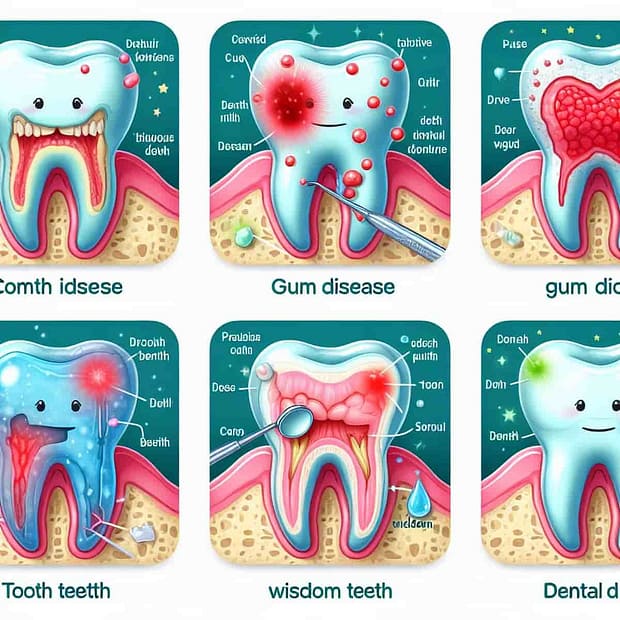Your oral health is a cornerstone of your overall well-being, but it’s vulnerable to a variety of problems that can arise unexpectedly. From pesky cavities to more serious conditions like oral cancer, understanding the causes, recognizing symptoms, and knowing how to address these issues is crucial for maintaining a radiant smile and optimal health. Let’s explore some common oral health problems in detail:
Key Takeaways:
- Oral health problems encompass a wide range of issues, from tooth decay to oral cancer.
- Early detection and prompt treatment are essential for preventing complications and preserving oral health.
- Adopting good oral hygiene practices and scheduling regular dental check-ups are key preventive measures.
1. Cavities (Dental Caries)
Causes: Cavities develop when bacteria in plaque produce acids that erode tooth enamel, leading to decay.
Symptoms: Tooth sensitivity, pain when eating or drinking, visible pits or holes in teeth.
Solutions: Treatment typically involves removing the decayed portion of the tooth and filling the cavity with materials such as amalgam or composite resin.
2. Gum Disease (Periodontal Disease)
Causes: Plaque buildup along the gumline causes inflammation and infection of the gums.
Symptoms: Red, swollen, or bleeding gums (gingivitis), gum recession, loose teeth (periodontitis).
Solutions: Scaling and root planing (deep cleaning), antibiotics, and in advanced cases, gum surgery may be necessary to restore gum health.
3. Tooth Sensitivity
Causes: Exposed tooth roots due to gum recession, enamel erosion, or tooth decay.
Symptoms: Pain or discomfort when consuming hot, cold, sweet, or acidic foods and beverages.
Solutions: Desensitizing toothpaste, fluoride treatments, dental bonding, or surgical procedures to cover exposed roots.
4. Toothaches
Causes: Tooth decay, gum disease, dental abscess, cracked or fractured teeth.
Symptoms: Persistent tooth pain, swelling around the tooth or gums, sensitivity to pressure or temperature.
Solutions: Treatment varies depending on the underlying cause and may include fillings, root canals, or tooth extraction.
5. Oral Cancer
Causes: Tobacco use, excessive alcohol consumption, HPV infection, prolonged sun exposure (for lip cancer).
Symptoms: Mouth sores that don’t heal, persistent sore throat, difficulty swallowing or chewing, changes in voice.
Solutions: Early detection through routine oral cancer screenings is crucial for successful treatment. Treatment options may include surgery, radiation therapy, or chemotherapy.
6. Bad Breath (Halitosis)
Causes: Poor oral hygiene, gum disease, dry mouth, smoking, certain foods.
Symptoms: Persistent unpleasant breath odor.
Solutions: Improving oral hygiene habits, staying hydrated, avoiding tobacco, and using mouthwash can help combat bad breath.
7. Dry Mouth (Xerostomia)
Causes: Medications, certain medical conditions, dehydration, radiation therapy.
Symptoms: Sticky or dry feeling in the mouth, frequent thirst, difficulty chewing, altered sense of taste.
Solutions: Drinking plenty of water, using saliva substitutes, avoiding alcohol and caffeine, and practicing good oral hygiene can help alleviate dry mouth symptoms.
Tips for Prevention:
- Maintain good oral hygiene: Brushing twice daily, flossing regularly, and using mouthwash can help prevent plaque buildup and dental issues.
- Visit your dentist regularly: Schedule dental check-ups at least twice a year for professional cleanings and early detection of oral health problems.
- Watch your diet: Limit sugary and acidic foods and drinks, which can contribute to tooth decay and erosion.
- Avoid tobacco and excessive alcohol: Tobacco use and heavy alcohol consumption increase the risk of gum disease, oral cancer, and other oral health issues.
- Stay hydrated: Drink plenty of water throughout the day to keep your mouth moist and wash away food particles and bacteria.
In conclusion, understanding common oral health problems, their causes, and how to address them is essential for maintaining a healthy smile and overall well-being. By practicing good oral hygiene habits, staying vigilant for signs of trouble, and seeking prompt dental care when needed, you can safeguard your oral health for years to come. Remember, your dentist is your partner in achieving and maintaining optimal oral health, so don’t hesitate to reach out if you have any concerns or questions.













